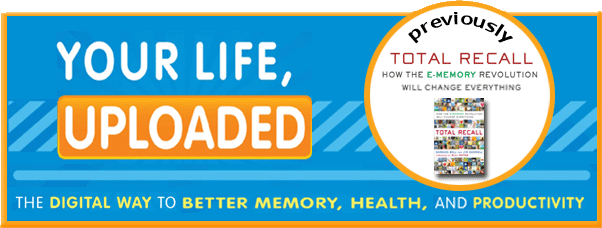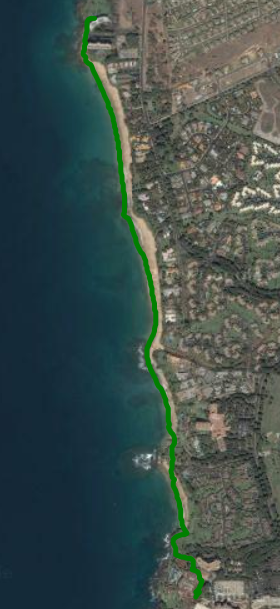The e-memory revolution is changing everything.
Be part of the conversation.
Betsy Sparrow, Columbia U. Confirms: MyLifeBits thesis e-memory effectively offloads personal bio-memories
 Friday, August 5, 2011 at 10:06AM
Friday, August 5, 2011 at 10:06AM The major thesis of MyLifeBits is that by the e-Memory is ground truth, and that a person's bio-memory is indeed just a URL plus some meta-data to aid human memory search of the e-memory. While the paper addresses finding and recalling web information-- finding and recalling information on personal stores is similarly applicable.
Prof. Sparrow's work is described in an article in Science Magazineon 14 June 2011, and a summary of this is described in the http://news.columbia.edu/research/2490 press release.
A report by John Bohannon in ScienceMag on 15 June stated:
...in four cleverly designed experiments, Sparrow and her colleagues do explore how the Internet may be changing the way people handle such information now. The results, she says, support a growing belief that people are using the Internet as a personal memory bank: the so-called Google effect. What surprised Sparrow most was not people’s reliance on nonmemorized information but their ability to find it. “We’re remarkably effi cient,” she says.
The study is “convincing,” and “there is no doubt that our strategies are shifting in learning,”says Roddy Roediger, a psychologist atWashington University in St. Louis, Missouri “Why remember something if I know I can look it up again? ... we can off load some of our memory demands onto machines.”
 experimental data,
experimental data,  web search in
web search in  Learning,
Learning,  Memory
Memory Memolane: A MyLifeBits for bits you thought were lost at all of your social networks
 Friday, August 5, 2011 at 9:43AM
Friday, August 5, 2011 at 9:43AM Memolane is a social network for memories. It allows you to see all your online social content in one place by pulling it into a beautiful timeline of your online life. It's like a scrapbook that creates itself. You can go back in time and see your first ever posts to Facebook, Twitter, photo sites, etc.
You can look at my own public Memolane at www.memolane.com/gordonbell to get an idea of how it picks up content to create an aggregate timeline of some aspects of your public life.
Basically, Memolane allows you to get your life as projected into cyberspace and project whatever aspects you want on a nice timeline. g
 social netwoks,
social netwoks,  timelines in
timelines in  Immortality,
Immortality,  Memory,
Memory,  MyLifeBits
MyLifeBits Business Intelligence TV - Gemmell interview
 Thursday, August 4, 2011 at 9:39AM
Thursday, August 4, 2011 at 9:39AM Jim Gemmell was interviewed by Business Intelligence TV
We've all had that memory from our past that we can't quite recall all the details of no matter how hard we try. This week, we talk with Jim Gemmell, co-author of Your Life, Uploaded, who tells us why this won't continue to be a problem in the near future. With data storage getting cheaper by the day, the rapid adoption of self-measurement and recording devices, and software to organize this data, humans will have the ability to record virtually every aspect of their life if they choose to. In essence, we will be able to access our lives with the click of a button.
Bruno discusses with Jim the explosion of cheap data storage, implications on our personal lives, and how it will allow companies to measure and store aspects of their business that weren't previously imaginable. They even discuss new and innovative ways of finding the millions of documents we now store with search terms "find all documents saved on days when the temperature outside exceeded 90 degrees!" Watch our latest video and learn more about how big data collection and correlation can help your business
A little Total Recall in high school
 Thursday, July 28, 2011 at 6:13PM
Thursday, July 28, 2011 at 6:13PM Teacher Kelvin Dueck is using OneNote and SkyDrive in an innovative way - and part of his approach relates to our chapter on education. To begin with, he realized the advantage of having copies of all lessons, tests and reviews from previous years:
"It was such a time-saver for me to only [have to] prep lessons. That's where initially my lights went on, where I already started to see — just in terms of static content — what I could do to share with students and colleagues."
Then he realized the value of recording explanations:
"With the screencasts, I learned that if I'm going to explain something to a colleague once, why don't I just hit Record and then upload it afterwards? A lot of the videos are me, sitting down with one colleague and showing them how to do it, and remembering to hit Record ahead of time."
All of his classroom lectures are also recorded and shared on SkyDrive.
There is much more to his technique - check out the whole article.

